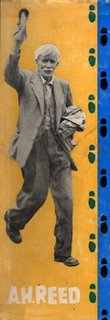 Ian Dougherty
Ian DoughertyFor Reed, collecting rare manuscripts and books was not an act of personal avarice and possession. In 1925 he divided his Bible collection between the theological colleges of the Methodist and Presbyterian churches: Trinity Methodist Theological College in Auckland and Knox Theological College in Dunedin.
With the disposal of his Bibles collection in 1925, Reed decided to build up a new collection with the idea that it would eventually go to the Dunedin Public Library. The library had opened in 1908 in a superb building in Moray Place, courtesy of United States millionaire Andrew Carnegie, but with few books. The first city librarian, William McEwan appreciated Reed’s intention of donating his collection to the financially strapped library one day, but suggested that in the meantime some of the material might be put on display. Reed did not want any publicity but began to anonymously exhibit autograph letters in the library. The album he had put together containing 60 letters was placed in the library’s entrance hall, and a new page turned each week.
The dogged librarian pressured Reed to make further material available for display. I July 1926, having already agreed to display autograph letters in the library, Reed wrote to McEwan:
‘Now, with regard to the Bibles, MSS and ‘Association’ books. I have been turning this over, and have come to the conclusion that your suggestion ought to be complied with, or at any rate given a trial, and Mrs Reed agreed with me that it might be a bit selfish to keep these things in our hands until our executors hand them over in due time, instead of making them available now to a wider circle. Whatever is done, I think for the meantime we would like it to be anonymous. But I would like all exhibits to be kept together, or ‘earmarked,’ as there is provision in our wills for providing all necessary casing and making it a named collection.’
During the 1920s, Reed mellowed in his attitude towards publicity. In 1926, he declared that he was putting together a collection of ‘association’ books that would eventually go to the Dunedin Public Library. In 1929, he made it known that the autograph letters housed in the library were his and would eventually become the property of the citizens of Dunedin. He also wrote regular articles for the Otago Witness, regarding autograph letters he had purchased, and a series of ‘chats’ on original letters and books associated with ‘great men and women,’ which were illustrated in the newspaper and then exhibited in the public library.
In 1929, Reed began discussing with McEwan the mechanics of gifting his entire collection to the library.
From chapter 6 of Books and Boots – the story of New Zealand publisher, writer and long distance walker, Alfred Hamish Reed, published by the University of Otago Press, 2005
No comments:
Post a Comment